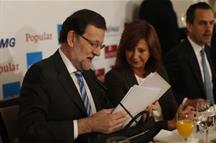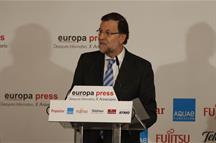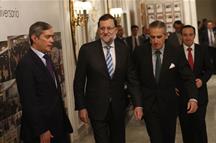Mariano Rajoy announces that the Spanish economy will grow by 2.9% in 2015
President's News - 2015.4.27
Villa Magna Hotel, Madrid
Mariano Rajoy said that Spain will be the major euro economy to post the best growth "with a marked difference over the Eurozone average". He stressed that in 2015 the Spanish economy would grow by 2.9% and that in 2016 "the figure would be in the same region".
However, Mariano Rajoy warned that if these forecasts are to be realised, it is necessary to "keep up the momentum for reform that has underpinned our entire administration". The President of the Government also stressed the priority given to R&D+i in the 2015 budget, "with a bigger allocation of close to 5%".
The President of the Government also explained that the real cause of poverty and inequality is unemployment: "It is the crisis, and not the struggle against the crisis, that is the threat to social policies. This is why we have made job creation our main priority".
Defence of the Welfare State
Rajoy defended the Welfare State, "the like of which does not exist anywhere else in the world". He explained, however, that "to maintain our Welfare State in a global and competitive world, we are required to be extremely ambitious in the implementation of reforms and extremely efficient and balanced in the management of our resources".
According to the President of the Government, economic stability and reforms are what should guide the future of Spain. He also reminded his audience of what was the "great national goal", a completely "achievable" target: to reach a total of 20 million jobs. "This is the threshold that ensures the sustainability of our Welfare State", he added.
For years the Spanish economy had been accumulating lethal imbalances
 Pool MoncloaMariano Rajoy recalled how we were in 2005: "Spain was then experiencing an untroubled economic situation". He explained that ten years ago "nobody paid any attention to what was important and the need to make reforms was ignored", and so "the Spanish economy accumulated lethal imbalances which triggered the worst crisis that Spain has suffered in generations".
Pool MoncloaMariano Rajoy recalled how we were in 2005: "Spain was then experiencing an untroubled economic situation". He explained that ten years ago "nobody paid any attention to what was important and the need to make reforms was ignored", and so "the Spanish economy accumulated lethal imbalances which triggered the worst crisis that Spain has suffered in generations".
The President of the Government added that those serious imbalances in the Spanish economy led to a recession, with the consequent rise in unemployment (3,400,000 people lost their job between 2008 and 2011) and plummeting public revenue (70 billion euros), and major problems finding financing. According to Mariano Rajoy, two solutions were mooted: to abandon the euro or to ask Europe for a bailout. However, the government chose a third way which "was neither the easiest nor the quickest", but it believed that this was "the fairest, the wisest, and the most sustainable". The government took the path of reforms in order to become more competitive and get back on the path of economic growth and job creation.
In this respect, Mariano Rajoy explained that the government's action plan was based on three pillars: a programme of fiscal consolidation, a clean-up of the financial system, and the implementation of the reforms required to become competitive again. All these reforms, he added, "taken as a whole, represent the greatest and most vigorous modernisation effort experienced by Spain in its recent history".
The country is back on track
Mariano Rajoy announced that "as a result of all these policies, the country has clearly been brought back on track", since deep-seated imbalances have been corrected and the country has gained in competitiveness. Thus, the public deficit has shrunk from 9% to 5.7%; the low inflation rate has enabled Spain to improve its competitiveness and export capacity; the banks have successfully passed the European stress-tests and, finally, the risk premium has "plummeted".
But, added the President of the Government, the most important thing is that we have returned to economic growth and job creation: in 2014 the Spanish economy grew by 1.4% and 500,000 jobs were created.
Mariano Rajoy stressed that all this effort towards recovery has been made "while safeguarding essential public services". Pensions have been raised every year, there are 800,000 more health insurance cards than in 2012, the number of university grants has increased, the protection of our more vulnerable citizens has improved, support for families has been improved by tax reforms, and poverty and exclusion indicators have started to fall.
Therefore, the President of the Government has set three major goals with an eye to the future: "to consolidate the recovery and prevent a backslide that will lose us the ground it was so hard to gain"; to improve the welfare of the middle classes while fighting against inequality and exclusion, and to ensure the sustainability of our Welfare State in the medium and long term.
Greece's commitments
 Pool MoncloaIn the question and answer session following the President of the Government's speech, he recalled that Greece's most important creditor is Europe and that Spain has made a bilateral loan to Greece of nearly 7 billion euros, the interest on which will begin to be paid in ten years' time. In Mariano Rajoy's opinion, the key does not lie in restructuring the debt, but rather in Greece growing and creating jobs, "and to do that it is necessary to do what everyone has done, which is fiscal consolidation, structural reforms, etc."
Pool MoncloaIn the question and answer session following the President of the Government's speech, he recalled that Greece's most important creditor is Europe and that Spain has made a bilateral loan to Greece of nearly 7 billion euros, the interest on which will begin to be paid in ten years' time. In Mariano Rajoy's opinion, the key does not lie in restructuring the debt, but rather in Greece growing and creating jobs, "and to do that it is necessary to do what everyone has done, which is fiscal consolidation, structural reforms, etc."
He also expressed his conviction that the best thing for everyone is that Greece meets its commitments. "It's possible to negotiate and talk with the European Union and reach a common sense position, and Spain, or at least the government I head up, is as keen as anyone for things to go well for Greece. We are always at the disposal of that country, of its leaders, and of its decision-makers, to seek solutions to their problems, but in life, when you have a commitment, it's as well to fulfil it, because if you don't there is no way you can keep things running smoothly; not in society, not between countries, not between people", he argued.
Fight against corruption
The President of the Government admitted that corruption issues had done "a lot of harm" and he stressed the measures adopted by the government to address this problem, "with a raft of laws and legislative initiatives such as have not been seen in Spain since 1977". He added that "It is another matter whether we have been successful in explaining it properly". He also spoke in defence of the independence with which all the institutions involved in the fight against corruption have acted; the Tax Agency, the General Intervention Board of the State Administration, the Public Prosecutor's Office and the State law enforcement agencies.
"We will continue to do everything that may be useful in that respect, but at the same time I have to say that I cannot see any reason for the creation of an aura of suspicion, or a general feeling that everyone involved in this worthy activity that is politics are people who do what should not be done", he said.
Other current affairs
 Pool MoncloaWith regard to the forthcoming general elections, the President said that his plan was for them to be held "towards the end of the year" and he expressed his desire to stand as a candidate: "Trust me, you'll be fine".
Pool MoncloaWith regard to the forthcoming general elections, the President said that his plan was for them to be held "towards the end of the year" and he expressed his desire to stand as a candidate: "Trust me, you'll be fine".
As for the elections in Catalonia, the President of the Government has repeated that "plebiscites do not exist". "The elections to be held in Catalonia, if they are to be held - and it's up to the President of the Regional Government of Catalonia to take that decision - are regional elections. That is what the Constitution and Spanish law as a whole says", he maintained. In reference to constitutional reform, he was of the opinion that at this point in time there is not "sufficient consensus" on this issue in Spain.
Asked about the rules on incompatibilities governing Spanish Members of Parliament, Mariano Rajoy pointed out that this was a matter for Parliament and that his government has regulated the incompatibilities affecting its members through the Statute on Senior Officials, "which includes all of them". In his opinion, it is advisable "not to take the MPs too far away from their grass roots" and to avoid falling into demagoguery in this matter.
Rajoy gave the latest update on the Spaniards who were in Nepal at the time of the earthquake which has shaken the country. The Spanish Government has not yet made contact with over a hundred of them and is going to send an Air Force aircraft "so that they can return to our country as quickly as possible", he explained.





